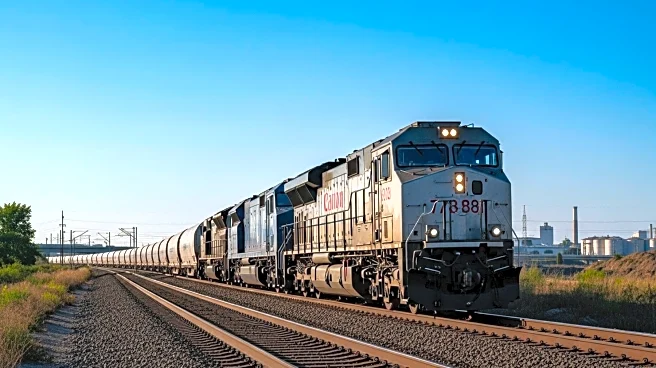What's Happening?
The freight rail and intermodal markets are experiencing incremental improvements in service levels and volumes, with rail carloads up 3.7% year-to-date. Analysts are closely monitoring the proposed Union Pacific/Norfolk Southern merger, which could have significant ripple effects on the industry. The market is navigating various challenges, including the lack of clear economic growth drivers, improving shipper-carrier relationships, and the adoption of new technologies. Coal and grain volumes have increased, while consumer-related commodities show weakness. Intermodal demand is expected to soften, influenced by tariff uncertainties and fluctuating ocean container rates.
Why It's Important?
The improvements in rail service are crucial for shippers who have faced multiple service failures in the past decade. The proposed merger between Union Pacific and Norfolk Southern could reshape the competitive landscape, potentially leading to more efficient single-line routes preferred by shippers. The adoption of new technologies, such as autonomous inspections, is expected to enhance safety and efficiency in rail operations. However, pricing remains a concern, as it is below cost inflation for many commodities, impacting profitability. The regulatory environment, including reciprocal switching rules, could influence future service levels and pricing strategies.
What's Next?
Service levels are expected to continue improving, particularly in the East as infrastructure projects are completed. The potential Union Pacific/Norfolk Southern merger is under review, with implications for competition and service offerings. Railroads are focusing on growth, with opportunities for intermodal expansion as trucking rates rise. The industry is poised for growth if manufacturing reshoring occurs, potentially increasing domestic commodity movements. Analysts anticipate that rail service improvements and strategic mergers could drive significant growth in the coming years.
Beyond the Headlines
The regulatory landscape, including the Surface Transportation Board's role in merger approvals, could significantly impact the industry's future. The integration of emerging technologies and automation in freight rail is crucial for maintaining competitiveness against autonomous truck operations. The industry's ability to adapt to economic cycles and regulatory changes will determine its long-term success. Shippers' preference for single-line routes highlights the importance of efficient service offerings in maintaining positive carrier-shipper relationships.









